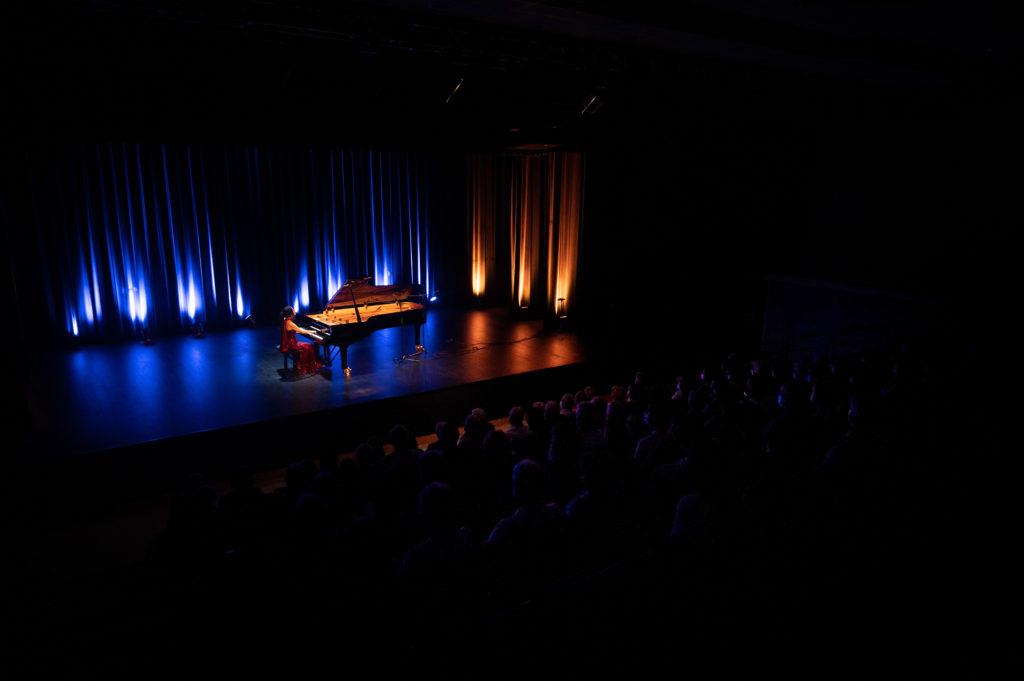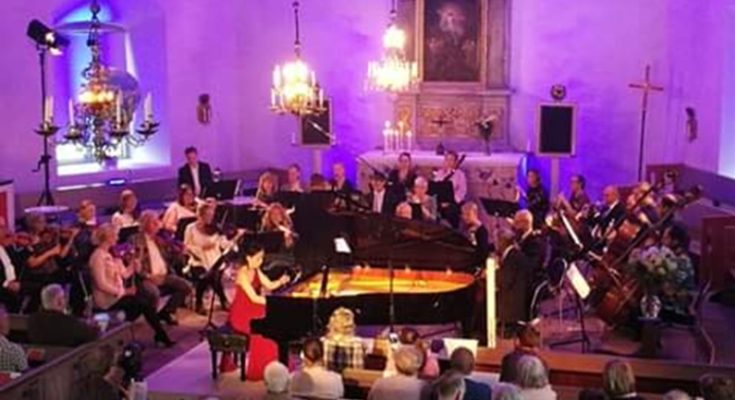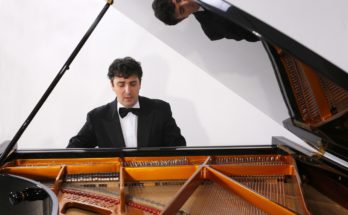PianoMe is used not only by locals, but also by international musicians. One of them is Tomomi Le Guinio. We caught up with Tomomi to talk about why she became a pianist and also about her current initiatives. She also told us why she likes PianoMe’s idea.
PianoMe (PM): Dear Tomomi, thank you very much for your time! It is a great pleasure for us that you are ready for an interview with PianoMe!
Tomomi Le Guinio (TLG): The pleasure is all mine! I’ve read the interviews with other artists on PianoMe, and I feel honored to be featured alongside them.
PM: That’s great, thank you! First of all, we would like to briefly introduce you to our readers, even though many of them probably already know who you are. You are the prize winner of many international piano competitions and have developed your own style of playing which deeply touches and inspires. You give solo and chamber music recitals mainly in Europe, and are actively engaged in performance activities, such as being invited every year as a soloist at festivals and orchestras around France.
TLG: That’s right. Currently my performances are primarily centered in Europe, especially in France. Occasionally I also travel to Northern Europe or Japan for concerts. However, as I’m raising children now, I’ve scaled back my schedule quite a bit. Once my kids are older, I’d love to take on more opportunities globally and perform wherever I’m invited.
PM: That sounds great! Can you please tell us first how you started getting into music, and as well, how you started playing piano, and what that’s been like for you?
TLG: To be honest, I don’t remember exactly how I got interested in the piano (laugh). But when I was in kindergarten, my school had a music program and, apparently, I told my parents I wanted to join it. The lessons there were quite unique compared to regular piano classes. Instead of focusing on practicing pieces, we were encouraged to imagine something and then turn it into music – a very creative approach.
I distinctly remember one moment early on: we did an exercise where I had to listen to notes blindfolded, and I could identify all the pitches correctly. That’s when my teacher realized I had perfect pitch and recommended me to a more specialized school.
That school wasn’t just about piano; we learned composition, improvisation, and solfège. They focused heavily on fostering creativity, and honestly, I loved going there even more than regular school! I didn’t start formal piano training until I was about 12 years old.
Later, I entered one of the most prestigious music schools in Japan, where I met the renowned teacher Germaine Mounier. Her visit to Japan inspired me to study abroad in France.
PM: What kind of composers influenced you the most?
TLG: That’s changed over the years. As a child, I was captivated by Chopin, Liszt, Gershwin, Rachmaninoff, and Tchaikovsky – the grandeur and romanticism of their music left a profound impact on me. After moving to France, I became deeply influenced by French Impressionist composers like Ravel, Fauré, and Debussy. In recent years, I’ve been drawn to more modern composers such as Kapustin and Fazil Say.
PM: Interesting! And what do you do offstage that provides inspiration on stage?
TLG: I absolutely love classical ballet. Whenever I have free time, I take lessons when the opportunity arises. The movements in ballet align perfectly with a pianist’s gestures. Through dance, I’ve learned about breathing, timing, stillness, and immersing oneself in the music – it’s brought me so much as a pianist. Watching ballet performances also provides endless inspiration.
PM: Tell me, what are your feelings and emotions when you perform in front of an audience? What emotions do you feel on stage?
TLG: For me, performing on stage is like a cry from the soul. All the joy, pain, sadness, and indescribable emotions I feel can be expressed through the piano. If that cry is genuine, it reaches the audience, and their emotional response comes back to me in return. It’s an indescribable exchange—a dialogue of souls. In those moments, all the sacrifices and hard work that go into being a performer feel completely worth it.

PM: When you take a set programme on an extended tour, do you think your performances vary that much as you play in the various cities?
TLG: Ideally, performances shouldn’t vary much between venues. However, factors like health or overall condition on the day can sometimes make a difference. Having said that, I like to change or add songs, it’s more fun for me and also more interesting for the audience, at least for those who come to see me several times.
PM: But I assume there also must be subtle differences between your practicing and preparation for a given concert and what actually comes out on stage?
TLG: Oh, absolutely! There’s definitely a difference between rehearsals and live performances. On stage, I’d say I manage to deliver about 50-60% of what I aim for during practice. Performing live involves a significant amount of stress, but if I can channel that nervous energy positively, I can sometimes exceed what I achieve in practice—it’s rare, but those moments are magical.
PM: How do you see the level of interest in classical music in France? And how is it in Japan?
TLG: Unfortunately, the interest in classical music in France seems to be declining year by year. While older generations still hold a strong appreciation for it, younger audiences are increasingly distancing themselves from classical music. That said, video games and movies often incorporate classical music, which might lead to a revival of interest in the future.
In contrast, classical music—especially piano—is much more popular in Japan. Most of my followers and viewers on social media are Japanese, and there’s a genuine enthusiasm for classical music there. Amateur pianists in Japan are also incredibly passionate – it’s amazing to see!
PM: And what do you feel needs to be done to grow classical music’s audiences?
TLG: Classical music has a reputation for being too formal or inaccessible. To attract a broader audience, it’s essential to create more opportunities for people to experience it and to break down that “formal” barrier. Many people find themselves pleasantly surprised once they give it a try.
It’s also important to introduce audiences to new things and, why not, to mix genres. I obviously love the great composers, but there are a lot of lesser-known composers, recent and old, who are fantastic.
PM: As a musician, what is your definition of success?
TLG: True success isn’t about fame or money—it’s about being a genuine artist. If you’re chasing after fame or financial gain, you lose sight of the real mission of a musician.
I say that but it’s true that only a very small number of people manage to make a decent living from their art, and thinking of nothing else but playing without worrying about the financial side is a luxury.
PM: By the way, as a musician yourself, you know that the journey is never sweet and easy. What advice would you give to someone hoping to build a career as a musician?
TLG: You need a strong sense of motivation and purpose, along with the willingness to embrace significant sacrifices. Becoming a professional requires much more than a bit of effort—it demands relentless dedication. Additionally, you must see failures as opportunities and develop the mental strength to turn them into growth.
PM: Thank you! I’m really sorry, but I have to ask (laughing). Would you recommend PianoMe to musicians?
TLG: Absolutely! Pianists often travel and struggle to find practice spaces, so a service like PianoMe, which provides accessible and affordable rehearsal venues, is invaluable. I would strongly recommend it to all pianists!
PM: Thank you! It shows us that we are on the right track! Finally, what are your aims for the future? Would you like to share any announcement with our readers?
TLG: During the pandemic, when live concerts were drastically reduced, I started sharing my performances online through platforms like YouTube. (YT Channel: Tomomi Concertiste) While live concerts are irreplaceable, I believe providing easy access to music online will continue to grow and play a key role in making classical music more accessible. My goal is to continue performing in traditional concert settings while expanding my online presence to reach as many people as possible.
PM: Dear Tomomi, we thank you for the interview and wish you all the best!
TLG: Thank you! It’s been a truly meaningful experience for me as well.
Copyright photos:
Main photo: @ Thomas Ahrén du Quercy
Second photo: @Aurèle Bossan




